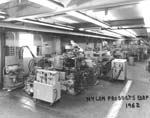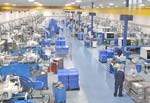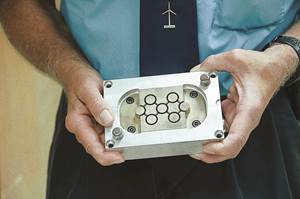From Small Entrepreneur To Global Mega-Molder
Nypro Inc., one of the largest custom injection molders in the world, with 66 operations in 18 countries, started 50 years ago in a converted mill building in Clinton, Mass.
Nypro Inc., one of the largest custom injection molders in the world, with 66 operations in 18 countries, started 50 years ago in a converted mill building in Clinton, Mass. It was then named Nylon Products Corp. and its sole aim was to mold products from nylon, which was the first and only engineering thermoplastic at the time. It was also the toughest processing challenge of the day for molders who had only plunger machines to work with, since the reciprocating screw was not yet on the market.
One of the company’s founders, Fred Kirk, tried fruitlessly to mold the material at his F.J. Kirk Molding facility in Leominster, Mass. So he created a separate company, Nylon Products, in 1955 specifically to tackle this challenge. Nylon expertise arrived in the form of Gordon Lankton, who joined Nylon Products in 1962 and became half-owner. He brought with him an insider’s knowledge of the material, having worked previously as a technologist in the Plastics Dept. of DuPont, where nylon was invented. Lankton had also been general manager of the Plastics Div. of Stanley Tools in Clinton prior to assuming his new role as president and chairman at Nylon Products.
Some of those early nylon molding projects were simple items, such as hair combs. One the first major durable parts was a flashlight for Ray-O-Vac. “The drop test was a drop from an eight-story building,” Lankton recalls. The company’s openness to tackle tough molding challenges helped it to spot and capitalize on early trends in ways that other molders could not.
Three developments changed the course of the company. First, Fred Kirk retired in 1969. This freed the company’s growth potential because Kirk had believed that, for the sake of efficient management, no individual molding company should be more than a $2-million/year business and should spin off another business if it threatened to grow beyond that limit.
Second, at about the same time, large corporations in search of new markets and lower production costs began to establish plants nationwide and then abroad as well. Lankton absorbed the message of a DuPont economist who said, “Whatever you are doing successfully in your business on a domestic basis you should start doing on an international basis.” Until that time, Nylon Products had served only customers within a 200-mile radius. Lankton realized that it was no longer possible to keep up just by knowing what’s going on in the U.S., since plastics products were beginning to come into the U.S. from all over the world. Today, 60% of Nypro’s 13,000 employees are outside the U.S. and 60% of its revenues are generated abroad.
Third, molded part tolerances began to narrow. That launched Nypro on a continuing quest for the latest technology and quality-management concepts. It became an early adopter of SPC and advertised its corporate quality commitment with the slogan, “Cpk of 2 or we won’t take the job.”
Becoming a leader
Over the next five decades, Nypro defined itself as a pioneer by transforming the company in ways that ultimately shaped the U.S. molding industry. It was one of the first U.S. custom molders to establish operations offshore, the first to automate the molding cell, the first to develop a clean-room operation, one of the first to use closed-loop microprocessor controls, one of the first to take quality control to a higher level with SPC and Six Sigma. Nypro is also one of the earliest molders to create and integrate departments that complement its molding operations, such as part design, tool making, automation auxiliaries, and assembly.
The company also took the lead in addressing the chronic shortages of skilled workers in plastics by starting Nypro University, which offers Nypro’s and other firms’ employees and local trade-school students training in a range of courses from basic injection molding technology to advanced SPC, mold design, leadership skills, and principles of supervision. It has college partnerships in the U.S., Europe, Asia, and Latin America. It is accredited and is accessible online.
From simple beginnings, Nylon Products, known as Nypro since 1978, grew from a $4-million/yr business at one plant into a multi-national company running 1500 injection machines (mostly from 50 to 250 tons), handling more than 10,000 molding jobs, and generating sales of $957 million in 2005.
Nypro’s main markets today include two that have been its staples for 40 years—healthcare and consumer industrial products—as well as newer ones like electronics, telecommunications devices, automotive, and (in the past year) packaging.
The company grew partly through a small number of acquisitions, but mainly by building dozens of new plants. Nypro developed a design template for those plants that ensured a clean, uncluttered molding environment by moving all utilities and material handling to a basement level below the molding room.
Reshaping the business
Nypro learned a lesson with every new venture. Its first $10-million project was for making price tags that hang on garments. “We had to make 20 million a day. They sold for 56¢/1000 tags,” recalls Lankton. The product ran in nylon for about five years, and then the customer switched to polypropylene and to another molder. “But we learned how to handle a big customer, and because of that we were capable of growth,” says Lankton. Since then, the company has focused on serving large world-class corporations, a move that spurred its expansion into services beyond just molding. Nypro typically handles contracts for $5 million to $100 million and very few less than $1 million.
In the 1960s, Nylon Products formed its first joint venture for molding outside of the U.S. It invested about $10,000 in a small company in Mexico. The customer ended up selling less than 10% of what was predicted, so the venture quietly folded up.
The firm’s first offshore success was in 1973 when Gillette and Johnson & Johnson both decided to open plants in Puerto Rico. “They were going to leave us but we decided to follow them and continue the relationship,” says Lankton. This allowed for Just-in-Time deliveries and also allowed Nypro to help with new product design at a moment’s notice.
Then the firm made another try at joint ventures. In the early 1970s Dennison Manufacturing Co. in Framingham, Mass., wanted plastic fasteners produced in Asia for products to be sold in Japan. “We queried GE and DuPont as to who the best molders were in the area, then we approached them with a joint-venture proposition,” says Lankton. “We chose to produce in Taiwan. We invested $100,000 and bought 15% of the venture’s stock. We later increased our stake to 50% and moved the venture to Hong Kong. The relationship worked well and continues today. The more we got into these associations, the more we learned we didn’t have all the answers back here in the U.S.” Nypro today has 10 joint ventures outside the U.S. and 11 more domestically.
Cleanroom debut
“Before there was cleanroom injection molding, most medical parts were washed,” says Lankton. In 1978 Nypro was looking for a way to put an injection machine into the atmosphere of a hospital room. “What we designed met the criteria for a class 20,000 cleanroom,” says Lankton.
Nypro’s medical-parts business led it into other new technologies. A pioneering application was a fluid tester for Abbott Laboratories that had clear acrylic passageways that were very small and had to hold a tolerance of ±0.0001 in. To get such tight molding tolerances, Nypro purchased machines from Swiss-based Netstal, which were among the earliest with closed-loop microprocessor controls. From this medical application, Nypro learned how to achieve high-precision molding.
In the 1980s Nypro was, by its own account, the first U.S. molder to “robotize its factories” by standardizing on manufacturing cells with a robot on each press. Lankton saw how automated parts handling was being used in Japan to keep parts from dropping or to separate runners from parts. “Robots were a quality-control device, and also a safety device, keeping operators’ hands out of molding area,” Lankton notes. Nypro struck a partnership with Sailor Pen Co. of Japan that lasted for 20 years. Nypro’s Automated As-semblies subsidiary also built robots for Nypro’s plants and eventually for sale to other molders.
The next step, says Lankton, came in 1988: “Customers insisted that we build our molds in-house, or else they wouldn’t give us the business. So we started a mold-building shop. Now we have 700 moldmakers worldwide in 10 different shops.”
Also in the late 1980s, quality standards were big news. Motorola got involved with the idea of Six Sigma quality, followed by big firms like GE. Standard processing tolerances until then were 1000 bad parts per million, but over the next 10 years the standards were trimmed down to 3 ppm (Cpk of 2). Nypro’s engineers helped them to reach that level and make it a company standard.
In the 1990s, Nypro started its own product-design shop, which helped it to understand the entire molding process even better and allowed Nypro to shrink tolerances from 0.1 in. into the micron range (0.00004 in.). The reward for achieving such tight control in high-volume production has been jobs such as molding 90% of the printer cartridges for Hewlett-Packard.
Setting new goals
Having grown by orders of magnitude, Nypro faces new challenges. One of the greatest is how to respond to sudden and huge demand. Consumer electronic devices such as cell phones, PDAs, and mini portable music players generate demand for millions of units within days after a product is introduced. To succeed in such an arena, “Molders need to be flexible and automated. They need a modular approach that allows for fast changeover and start-ups,” says Nypro president and CEO Brian Jones. He describes the current manufacturing climate is one of “mass customization,” so manufacturing systems must be flexible enough to produce for individual consumers.
“More important than low cost and globalization these days are a flexible global manufacturing supply chain,” says Jones. “A business has to be able to deal with demand that moves from zero to infinite and do it globally.” He cites the example of the Blackberry PDA. Nypro carries out 90% of the design and manufacturing for this product. “The newest model out this year generated demand for one million units in a week,” says Jones. Nypro is relying on information technology that allow quick and in-depth assessment of its capabilities. It is working on new statistical software for tracking plant operations in new ways.
Nypro is also looking at other areas of development. It is patenting a new tool-building technique that creates a fully hardened steel tool capable of 1 million shots that can be delivered in 12 days at a cost 40% less than current toolmaking. “We are finding that in a typical 12-week tool build, 80% is wasted time,” says Jones.
Nypro is also looking into its first magnesium-molding machine and plans to start up its first blow molding operation—both extrusion and injection blow—later this year.
Related Content
Injection Molding: Focus on these Seven Areas to Set a Preventive Maintenance Schedule
Performing fundamental maintenance inspections frequently assures press longevity and process stability. Here’s a checklist to help you stay on top of seven key systems.
Read MoreBack to Basics on Mold Venting (Part 1)
Here’s what you need to know to improve the quality of your parts and to protect your molds.
Read MoreProcess Monitoring or Production Monitoring—Why Not Both?
Molders looking to both monitor an injection molding process effectively and manage production can definitely do both with tools available today, but the question is how best to tackle these twin challenges.
Read MoreHow to Select the Right Tool Steel for Mold Cavities
With cavity steel or alloy selection there are many variables that can dictate the best option.
Read MoreRead Next
See Recyclers Close the Loop on Trade Show Production Scrap at NPE2024
A collaboration between show organizer PLASTICS, recycler CPR and size reduction experts WEIMA and Conair recovered and recycled all production scrap at NPE2024.
Read MorePeople 4.0 – How to Get Buy-In from Your Staff for Industry 4.0 Systems
Implementing a production monitoring system as the foundation of a ‘smart factory’ is about integrating people with new technology as much as it is about integrating machines and computers. Here are tips from a company that has gone through the process.
Read More














